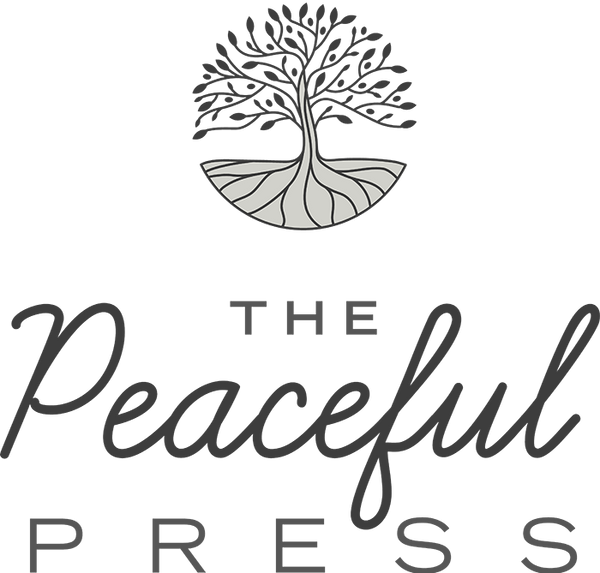When it comes to homeschooling, there’s no one-size-fits-all. At The Peaceful Press, we’ve found that a thoughtful blend of educational philosophies—grounded in literature, nature, and developmental science—creates the most nurturing, joyful learning environment for families.
Our approach brings together three powerful influences: Charlotte Mason’s rich educational vision, Montessori’s hands-on early childhood practices, Waldorf's whole-child approach and modern research on brain and child development.

A Charlotte Mason–Inspired Homeschool Core
At the heart of our curriculum is the timeless philosophy of Charlotte Mason, a British educator who emphasized respect for children as whole persons. We prioritize living books—beautiful, well-written literature that engages the imagination and builds character. Through habits like narration, children learn to think deeply, retell what they’ve read, and internalize rich ideas.
Charlotte Mason believed that education is “an atmosphere, a discipline, a life.” This means that learning doesn’t come only from textbooks, but from the environment we create at home, the habits we model, and the meaningful experiences we share.
In our resources, you’ll find:
- Daily read-alouds and picture study
- Gentle habit training and routines
- Exposure to nature, art, poetry, and music
Montessori Foundations for Early Learners
For the early years, we also draw from Maria Montessori’s emphasis on motor development, independence, and a prepared environment. Like Charlotte Mason, Montessori viewed children as capable and worthy of respect, and believed learning should be hands-on and self-directed.
You’ll see this in our preschool and kindergarten resources through:
- Practical life activities that build fine and gross motor skills
- Sensory-rich learning projects
- Beautiful, uncluttered materials that invite curiosity and concentration
- A focus on independence and responsibility, gently guided by the parent
Both Charlotte Mason and Montessori emphasized the importance of the early years—and our curriculum reflects this shared understanding.
Inspired by Waldorf: Rhythm, Beauty, and Imagination
Another quiet influence in our homeschooling style is Waldorf education, founded by Rudolf Steiner. Waldorf homeschooling emphasizes the power of imagination, rhythm, storytelling, and developmentally aligned learning. It honors the whole child—head, heart, and hands—through artistic expression, meaningful work, and a warm, consistent daily rhythm.
You’ll see Waldorf inspiration in our resources through:
- A focus on seasonal rhythms and celebration of the natural world
- Storytelling and oral narration as a foundation for language and connection
- Handcrafts, baking, and nature-based projects that nurture the will and hands
- A deep respect for protecting early childhood with simplicity and beauty
We find that Waldorf principles pair beautifully with Charlotte Mason’s appreciation for wonder and nature, and Montessori’s hands-on learning. All three offer ways to invite children into learning with reverence and delight.
Grounded in Child Development and Neuroscience
We also root our curriculum in developmental science. Drawing on the work of experts like Carol Stock Kranowitz, Angela Hanscom, Jane Healy, and Gordon Neufeld, we aim to support the way children actually grow—neurologically, emotionally, and physically.
This research reminds us that:
- Movement supports learning
- Attention grows through real-life engagement, not screens
- Secure attachment is the foundation for motivation and growth
- Delaying formal academics in favor of play builds stronger cognitive outcomes
That’s why our guides include:
- Ample time for outdoor play and nature walks
- Open-ended creative projects
- Gentle rhythms and routines that support emotional well-being
- Hands-on, developmentally appropriate learning—not busywork
Harmonizing Educational Traditions with Today’s Insights
Rather than choosing one method, we integrate the best of each:
- Charlotte Mason gives us vision, structure, and beauty.
- Montessori shapes our early learning activities with tactile, meaningful work.
- Waldorf adds imagination, rhythm, and reverence for childhood.
- Modern developmental research ensures our resources are practical and neurologically sound.
This harmony creates a rich, nourishing homeschool experience.
The Result: A Peaceful, Purposeful Homeschool
At The Peaceful Press, we believe in:
- Living education rooted in stories, nature, and wonder
- Hands-on learning that develops the whole child
- Rhythms that bring peace to your homeschool day
- Child-led exploration balanced with structured guidanceTools that support real development, not overwhelm or pressure
Whether you’re inspired by Charlotte Mason’s wisdom, Montessori’s respect for the child, or new insights in childhood development, our resources are designed to help your family thrive—and create joyful memories along the way.
Start with one of our bestselling homeschool resources:
The Peaceful Preschool – a gentle, literature-rich start for ages 3–5
The Playful Pioneers – a Charlotte Mason-inspired early American history guide
Nature Book Flood – a beautiful reading plan for connecting with nature

FAQ: Charlotte Mason, Montessori Waldorf and more in Homeschooling
Q: Can I blend Charlotte Mason, Montessori, and Waldorf in my homeschool?
Yes! These approaches may differ in methodology, but they share a deep respect for children and an emphasis on beauty, rhythm, and meaningful work. Charlotte Mason focuses on rich ideas and habits, Montessori on independence and sensory learning, and Waldorf on imagination, artistry, and seasonal rhythm. Together, they form a well-rounded and holistic homeschool philosophy—especially in the home setting where flexibility allows for gentle integration.
Q: Is this approach academic enough?
Absolutely. A foundation built on literature, observation, movement, and creativity actually supports stronger long-term academic success. Through story-based learning, hands-on projects, and thoughtful rhythm, children develop language, math readiness, fine motor skills, and critical thinking—all at a pace that honors their development.
Q: What if I feel overwhelmed by all the methods?
You don’t have to do it all at once. Start small—maybe with a daily read-aloud (Charlotte Mason), a practical task like sweeping or pouring (Montessori), or a seasonal craft (Waldorf). The goal isn’t perfection but creating a home environment that nourishes connection, curiosity, and growth.






